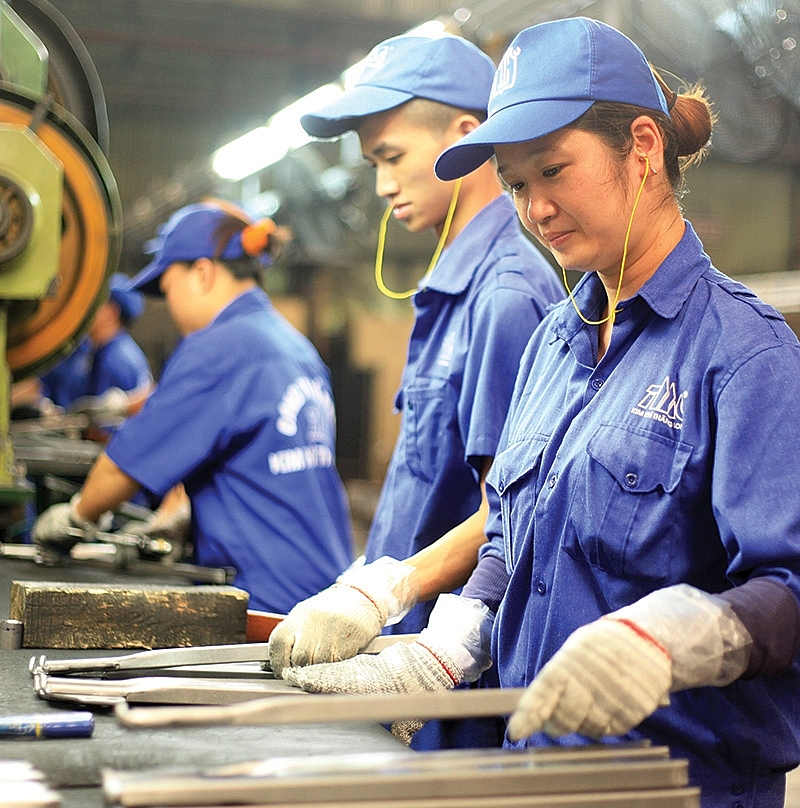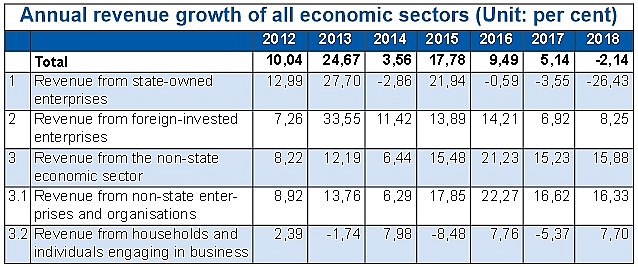Developing from strength to strength
 |
| Privately-owned enterprises are ahead of the pack in state revenue contributions, Photo: Le Toan |
After nearly 20 years since opening his rice shop, Dang Dinh Kien last May decided to turn the shop into a company specialised in trading rice, selling to restaurants and people in Hanoi.
“We have been expanding production and business by securing new rice suppliers from the Mekong Delta,” Kien told VIR. “We currently have two rice processing facilities at Hanoi’s Quang Minh industrial park, and the company’s total investment capital stands at about VND50 billion ($2.17 million).”
According to Kien, since the shop was developed into Hoang Ngoc Trading JSC, they have been finding it easier to do business because the company now has a registered stamp and invoices to sign contracts with customers.
“Previously, I had never thought about opening a company, but business conditions have significantly improved,” Kien said.
Hoang Ngoc Trading was among nearly 131,000 newly-established enterprises last year with the total registered capital of VND1,478 trillion ($64.26 billion), up 3.5 and 14.1 per cent against 2017.
Also in 2018, operating enterprises added VND2,409 trillion ($104.74 billion) to their business, raising total capital in the economy to $168.6 billion. Besides, 34,010 enterprises resumed operations, up 28.6 per cent on-year.
In the first quarter of 2019, Vietnam saw 28,451 newly-established enterprises, registered at VND375.5 trillion ($16.33 billion), up 6.2 per cent in the number of enterprises and 34.8 per cent in capital on-year.
According to the Party Central Committee’s Economic Commission, these impressive figures show that private-owned enterprises (POEs) in Vietnam are growing strongly, with their confidence improved significantly.
“The private economic sector has become an important propellant of the socialist-oriented market economy,” said a commission report on the results from the implementation of Resolution No.10-NQ/TW.
 |
| Source: The Party Central Committee’s Economic Commission |
Great contributions
The Economic Commission reported that since Resolution 10, the Vietnamese private economic sector has been developing by leaps and bounds. Specifically, as of June 30, 2018, Vietnam had more than 670,900 operational POEs.
Total investment ratio by POEs in the economy’s total development investment has kept increasing, from 38.7 per cent in 2015 to 38.9 per cent in 2016, 40.6 per cent in 2017, and 43.3 per cent last year.
The private economic sector has contributed remarkably to GDP, at 43.22 per cent in 2015, 42.56 per cent in 2016, and 41.74 per cent in 2017. It also accounts for 30 per cent of Vietnam’s industrial production value, nearly 80 per cent of total retail and service revenue, and 64 per cent of total transported goods.
Commending the role of the private sector, Nguyen Dinh Thang, chairman of LienVietPostBank, said that the government’s efforts to spur private enterprises over the past few years have helped further strengthen the major role of these enterprises.
“It is expected that Vietnam will grow 7 per cent this year. However, if the government issues more favourable conditions for enterprises to develop, such as cutting taxes and business conditions, the private economic sector will be able to help drive ther growth rate further, and make even bigger contributions to national development,” Thang said.
“For example, if corporate income tax is reduced, the number of private firms will rise to one million by 2020, 1.5 million by 2025, and over two million by 2030,” he continued. “It is expected that the private sector will hold 50 per cent of the GDP in 2020 and 60-65 per cent of the GDP in 2030.”
Vietnam’s ranking in the World Bank’s annual Doing Business survey surged to 69th in the world this year, from 99th in 2013, with strong gains in contract enforcement and regulatory environment. The country’s per capita income increased to an estimated $2,572 in 2018 from approximately $1,754 in 2012.
Vietnam’s competitiveness index increased from 56th out of 140 nations surveyed by the World Bank to 55th out of 137 nations in 2017.
“It is clear that Vietnam’s investment and business climate has been gradually improved, contributing to macroeconomic stability and economic development,” said the Economic Commission’s vice head Cao Duc Phat.
Newly-established enterprises have been increasing both in number and registered capital. The number of enterprises hit 655,000 by late 2017 and 730,000 by late 2018.
“The number of POEs has been strongly ascending and the private economic sector has been growing in scale, while playing an increasingly important role in socio-economic development and international integration,” Phat stressed. “This has affirmed that the implementation of Resolution 10 has led to positive results, especially the enhancement of POEs’ confidence in the policies of the Party and the state.”
A rise in revenue
After nearly two years of being implemented, the resolution has driven the private economic sector forward to make increasingly positive contributions to economic growth and the state coffers. Specifically, according to the Economic Commission, the state’s budgetary revenue from domestic POEs has been climbing at an average 15 per cent per annum, which is twice as high as that created by foreign-invested enterprises (FIEs). Meanwhile, the state budget revenue from state-owned enterprises (SOEs) has been decreasing strongly (see box).
“The government’s efforts to boost the startup movement and improve the local investment and business climate have created laudable initial results,” Phat said.
“Last year was the first time ever that POEs overtook FIEs and SOEs in state revenue contribution. These signals reflect the growth in scale and effectiveness of the private economic sector. POEs now also play a larger role in strengthening the national financial situation.”
In the case of Hoang Ngoc Trading, for example, Kien said that since last May, the company’s revenue has increased 20 per cent against the time the company remained a small shop.
Boosting reform needed
According to Ousmane Dione, the World Bank’s country director for Vietnam, government reform programmes are going in the right direction, and Resosolution 10 has created bigger spaces for the private economic sector to play. However, he stressed that more reforms would be needed. “If these reform programmes are sequenced and implemented effectively, they would open many positive opportunities for Vietnam,” he told VIR.
“Firstly, they would help the country consolidate and enhance macroeconomic stability as well as resilience amid the fast-changing and volatile global conditions. Secondly, reforms would help Vietnam improve the quality of its economic development and lift productivity growth. This is critical for the country’s long-term sustainable growth.”
Ousmane added, “Lastly, I would expect an opportunity for Vietnam to benefit much more from international integration, not only in economic terms, but also through skills and technological transfers and spill-over, as well as improvements in governance.”
Raymond Mallon, an Australian senior economist who has spent decades studying Vietnam’s economic situation, told VIR, “Administrative simplification in Vietnam has reached a defining moment. If successfully applied, the reductions of sub-licences can encourage enterprises to engage more in the market and create healthy competition among enterprises. They will help foster economic growth via the improvement of labour productivity, curb corruption, and also help create a more level playing field for all enterprises.”
Businesspeople like Kien from Hoang Ngoc Trading hopes the government will continue boosting reforms so that they can grow further in the country. “We are planning to construct our third rice processing facility later this year. I hope that conditions will continue becoming more favourable,” Kien said.
Thang from LienVietPostBank said that the government needs to create a level playing field for all enterprises of all economic sectors in order to play fairly. “A favourable legal framework is one of the most important issues now,” he said. “This will enable enterprises to develop.”
What the stars mean:
★ Poor ★ ★ Promising ★★★ Good ★★★★ Very good ★★★★★ Exceptional
 Tag:
Tag:
Themes: Unleashing The Private Sector
Related Contents
Latest News
More News
- State corporations poised to drive 2026 growth (February 03, 2026 | 13:58)
- Why high-tech talent will define Vietnam’s growth (February 02, 2026 | 10:47)
- FMCG resilience amid varying storms (February 02, 2026 | 10:00)
- Customs reforms strengthen business confidence, support trade growth (February 01, 2026 | 08:20)
- Vietnam and US to launch sixth trade negotiation round (January 30, 2026 | 15:19)
- Digital publishing emerges as key growth driver in Vietnam (January 30, 2026 | 10:59)
- EVN signs key contract for Tri An hydropower expansion (January 30, 2026 | 10:57)
- Vietnam to lead trade growth in ASEAN (January 29, 2026 | 15:08)
- Carlsberg Vietnam delivers Lunar New Year support in central region (January 28, 2026 | 17:19)
- TikTok penalised $35,000 in Vietnam for consumer protection violations (January 28, 2026 | 17:15)






















 Mobile Version
Mobile Version